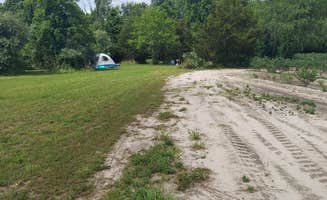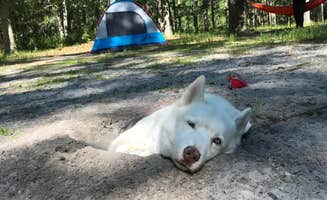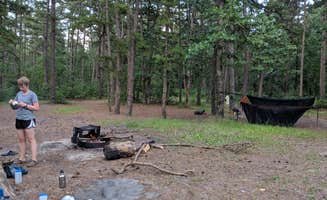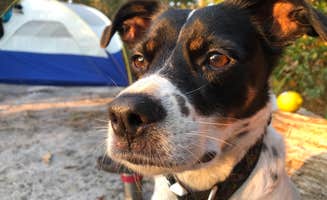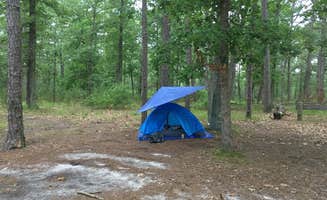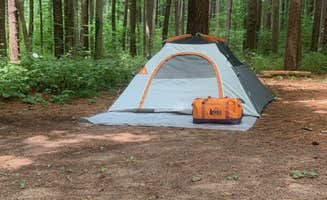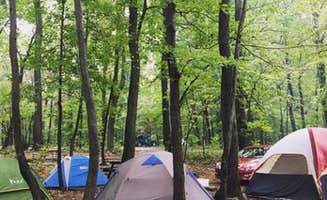Wharton State Forest dominates the camping landscape near Clayton, New Jersey, with a terrain characterized by sandy soil and rare geological features. The forest sits atop the Kirkwood-Cohansey aquifer system, which filters through the sandy soil to create the region's distinctive cedar-stained waterways. Most campsites throughout Wharton State Forest are situated on flat terrain at approximately 100 feet above sea level, allowing for easy tent placement without extensive site preparation.
What to do
River paddling trips: Wharton State Forest offers multiple waterways for canoe and kayak adventures. At Hawkins Bridge — Wharton State Forest, you can organize a multi-day paddling trip. One camper reported, "Did a two day Canoe tour down the wading river and used the outfitter Micks Canoe. We started Friday night camping at Hawkins Bridge campground." The Wading River provides a manageable current for most skill levels with "mostly easy with some trick currents for inexperienced paddlers."
Hiking the Batona Trail: The 50-mile Batona Trail connects multiple camping areas and serves as a backbone for shorter day hikes. Batona — Wharton State Forest offers direct trail access. "Best part of this campground is trailheads begin directly from campsites. Trails vary in length but all are flat and easily accessible," explains one reviewer. The trails provide a relatively easy hiking experience due to the flat terrain.
Blueberry picking: During summer months, wild blueberries grow throughout the forest. At Lower Forge Camp, one visitor noted, "Wild blueberries abound during summer months!" The sandy, acidic soil of the Pine Barrens creates ideal conditions for these berries, which typically ripen between late June and early August.
What campers like
Sandy terrain for comfortable tent setup: The unique Pine Barrens soil composition creates unusually comfortable tent sites. At Hawkins Bridge campground, campers appreciate that "the ground is soft and comfortable to sleep on (NOT rocky at all, like almost weird how few rocks there are)." This natural feature eliminates the need for thick sleeping pads that might be required in rockier camping regions.
Secluded walk-in sites: Goshen Pond — Wharton State Forest offers walk-in tent sites that create a buffer from vehicle traffic. A reviewer mentioned, "I like campgrounds which have you park off and walk in to your site. There is more foot traffic, but you don't hear as many cars coming and going and driving past your site all the time." These sites require a short walk from parking areas but reward campers with greater privacy.
Accessibility for beginner backpackers: Lower Forge Camp serves as an entry point for those new to backpacking. One camper explained it's "great for beginners who you're trying to break into backpacking" and noted it's "one of my personal favorites to disappear for a weekend." The relatively flat terrain and moderate hiking distances make this an achievable first backpacking destination.
What you should know
Insect preparation is essential: Ticks and other insects are abundant throughout the Pine Barrens, particularly during warm months. Multiple reviewers highlight this concern across campgrounds. At Bodine Field — Wharton State Forest, one camper "Left Godfrey bridge CG for this one due to ticks and had no issues." Bring appropriate repellents, conduct regular tick checks, and consider permethrin-treated clothing.
Water color is natural: The rivers and streams throughout the region have a distinctive dark brown color that can be mistaken for pollution. As one camper at Lower Forge explained, "Batsto River provides plenty of water for filtering—don't be weirded out by the brown color caused by tannins." This coloration comes from natural plant compounds and is safe for filtering with standard water treatment methods.
Limited amenities: Most campgrounds offer only basic facilities. Bodine Field provides "very rustic and secluded, no showers/running water. Outhouses all around the campground." Batona Campground has "a water pump provides fresh water but is not available in the winter. There's at least two pit toilets in the campground - don't expect luxury." Pack accordingly and bring necessary supplies.
Tips for camping with families
Scout and youth group-friendly sites: Bodine Field accommodates larger groups and is popular with scout troops. A reviewer noted, "Beautiful remote location w minimal amenities but 3 boy scout troops of screaming children didn't make it enjoyable." For a quieter family experience, this suggests weekday camping when the campground is less crowded, as another camper mentioned it's "very peaceful and awesome place to be during the week."
Beginner paddling options: Mullica River — Wharton State Forest offers good water access with relatively gentle currents. A camper described their experience: "we stayed at the Mullica River camp ground it is a hike or boat in only camp ground has a pump to get water and 2 outhouses (hold your breath) start hike kayak trIp at 206 hike 6 miles in camp then hike kayak out 5 miles to batsto." This provides options for families to either paddle in or hike to their campsite.
Swimming opportunities: Several areas near tent camping sites in Clayton provide swimming access. Goshen Pond Campground is located "a 5 minute drive from Atsion lake, a great place for kayaking and swimming." These designated swimming areas provide safer alternatives to the tannin-stained rivers for children.
Tips from RVers
Access limitations: The road conditions in Wharton State Forest can be challenging for larger vehicles. At Batona Campground, one RVer noted, "The road into the campground is about 1 mile of loose sand. It can be accessed by a standard vehicle. Site are suitable for tents or small campers. The unpaved road into the site is narrow and tree lined. A larger RV would not fit." Small trailers and pop-ups can access some areas, but larger rigs should consider alternatives.
Limited hookups: Tent camping near Clayton, New Jersey is more prevalent than RV camping with hookups. For those needing electric or water connections, options are limited. Instead, many RVers use smaller vehicles and camp with minimal setups. Batona Campground has "No RVs here. Very much enjoyed the stay," indicating a tent-focused environment where smaller campers may be welcome but larger RVs aren't accommodated.
Seasonal considerations: Sandy roads can become more difficult during certain seasons. After rain, some access roads may be challenging even for AWD vehicles. In drier periods, deep sand can cause issues for vehicles without adequate clearance or power. During spring thaw, typically February through April, some forest roads may be temporarily closed to prevent damage.


